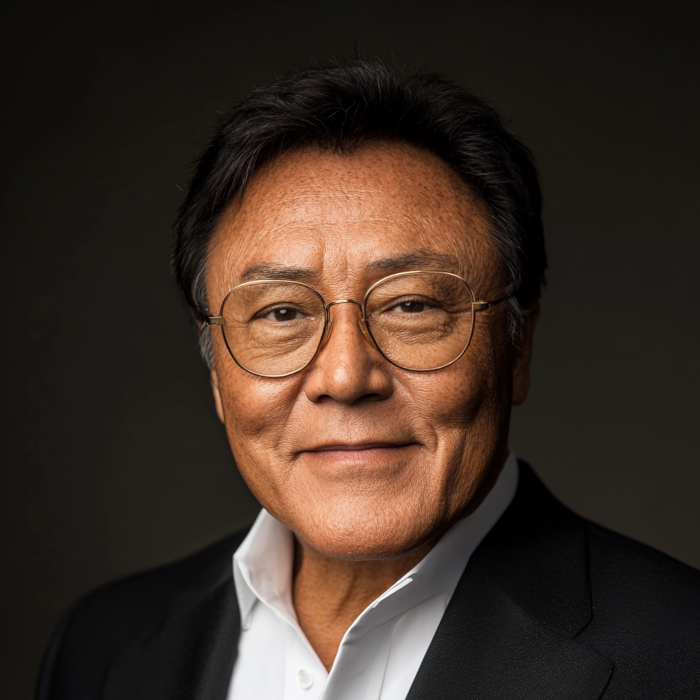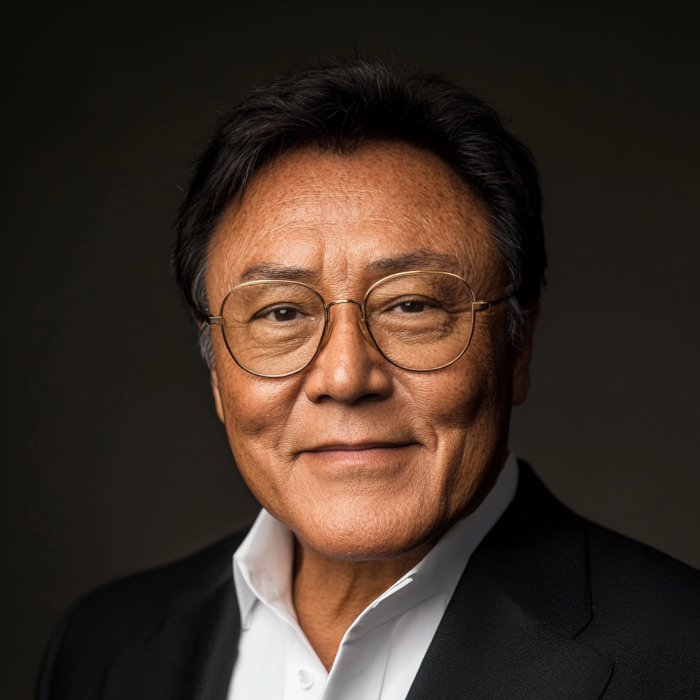


Robert Kiyosaki (born April 8, 1947) is an American entrepreneur, author, and motivational speaker best known for his book Rich Dad Poor Dad. The book, which advocates for financial literacy, investing, and building wealth through entrepreneurship and real estate, has become one of the best-selling personal finance books of all time. Kiyosaki’s teachings emphasize the importance of financial education and have inspired millions of readers worldwide to rethink their approach to money and investing.
Early Business Ventures: After his military service, Kiyosaki pursued various business ventures. In the late 1970s, he started a company that marketed nylon and Velcro surfer wallets, which initially saw success but eventually went bankrupt. Despite this setback, Kiyosaki continued to experiment with different business ideas, learning valuable lessons about entrepreneurship along the way.
Real Estate Investments: Kiyosaki's experiences in business led him to real estate, where he found significant success. He began investing in rental properties, which became a key component of his wealth-building strategy. His experiences in real estate, along with his desire to share his financial knowledge, eventually led him to become an author and educator.
Publication of Rich Dad Poor Dad: In 1997, Kiyosaki published Rich Dad Poor Dad, a book that would transform his career and establish him as a leading figure in the personal finance world. The book is based on his experiences growing up with two father figures: his biological father (referred to as "Poor Dad"), who was highly educated but struggled financially, and the father of his best friend (referred to as "Rich Dad"), who was less formally educated but financially successful. Through these contrasting experiences, Kiyosaki developed his financial philosophy.
Core Concepts:
Impact of Rich Dad Poor Dad: Rich Dad Poor Dad became a massive success, selling millions of copies worldwide and translating into dozens of languages. The book's approachable style and relatable anecdotes made complex financial concepts accessible to a broad audience. It has been credited with changing the way people think about money and inspiring many to pursue financial independence.
Books and Publications: Following the success of Rich Dad Poor Dad, Kiyosaki co-authored several more books, many of which became bestsellers. His Rich Dad series includes titles like Cashflow Quadrant, Rich Dad's Guide to Investing, The Real Book of Real Estate, and Rich Dad's Increase Your Financial IQ. These books expand on the principles introduced in his first book and offer more detailed advice on investing, entrepreneurship, and financial management.
Educational Programs and Seminars: Kiyosaki also developed a range of educational tools, including seminars, workshops, and online courses, designed to teach financial literacy and investment strategies. His "Rich Dad" seminars, which are often conducted in collaboration with other financial educators and real estate experts, have attracted a global audience.
Cashflow Board Game: In 1996, Kiyosaki created the "Cashflow" board game, designed to teach players about investing, cash flow management, and financial decision-making in an interactive and engaging way. The game has been used as an educational tool in schools, businesses, and by individuals seeking to improve their financial literacy.
Criticism of Advice: Despite his popularity, Kiyosaki's advice and methods have faced criticism. Some financial experts argue that his teachings oversimplify complex financial concepts and may encourage risky investments, particularly in real estate, without adequately addressing potential downsides. Critics also contend that some of his advice is anecdotal and lacks empirical evidence.
Business Practices: Kiyosaki's business practices, particularly the high cost of some of his seminars and educational products, have also come under scrutiny. Critics claim that these products are marketed aggressively and may not provide the value promised, leading to accusations that Kiyosaki exploits his followers' desire for financial success.
Response to Criticism: Kiyosaki has defended his approach, arguing that his goal is to challenge conventional wisdom about money and to inspire people to think differently about their financial futures. He maintains that his teachings are meant to empower individuals to take control of their financial lives.
Family and Personal Life: Robert Kiyosaki is married to Kim Kiyosaki, who is also an author and entrepreneur. The couple has co-authored books and run businesses together, focusing on financial education and real estate investment.
Legacy and Influence: Despite the controversies, Kiyosaki's influence on the world of personal finance is undeniable. Rich Dad Poor Dad and his other works have inspired millions of people to pursue financial literacy, entrepreneurship, and wealth-building. His emphasis on financial education, particularly the importance of understanding assets, liabilities, and cash flow, has resonated with readers worldwide.
Ongoing Work: Kiyosaki continues to write, speak, and teach about financial literacy and investing. He remains an active figure in the personal finance community, frequently appearing on podcasts, webinars, and at speaking events to share his insights.
Robert Kiyosaki’s Rich Dad brand has become synonymous with financial literacy and the pursuit of financial independence. His teachings have influenced countless individuals to rethink their approach to money, investing, and wealth-building. While his advice has been both praised and criticized, Kiyosaki's impact on the personal finance world is undeniable, and his work continues to inspire people around the globe to take control of their financial futures.

We use cookies
We use cookies and other tracking technologies to improve your browsing experience on our website, to show you personalized content and targeted ads, to analyze our website traffic, and to understand where our visitors are coming from. Privacy Policy.